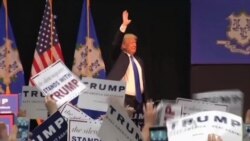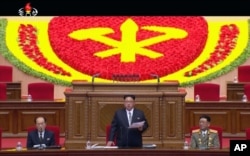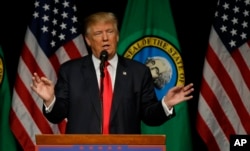In Japan and South Korea, America’s closest military allies in Asia, conservative proponents of nuclear weapons could move from the political fringes to the mainstream if Donald Trump becomes the next president of the United States.
“If Trump’s statements become a reality, there will be politicians that will agree and a lot will be enthusiastic, I believe,” said Hiroshi Nunokawa, a Japanese history professor at Hiroshima University.
Trump, who is now the presumptive Republican candidate for president, has suggested withdrawing troops around the world and arming Japan and South Korea with nuclear weapons, unless they agree to pay more for the U.S. military bases in their countries.
“If the U.S. allies defend themselves as Trump has said, the alliance will be broken, and it will lead to a nuclear domino situation in Asia,” said Moon Keun-sik, an analyst with the Korea Defense and Security Forum in Seoul.
There are currently 54,000 U.S. troops stationed in Japan and 28,500 in South Korea. Tokyo reportedly pays about $1.6 billion and Seoul pays over $866 million annually to Washington for the military bases in their countries.
Trump’s openness to arming allies with nuclear weapons would violate the U.S.’s longstanding commitment under the Nuclear Non-proliferation Treaty to prevent the spread of these weapons of mass destruction.
“If he becomes president he has to take responsibility for the fate of humankind. He cannot avoid the dangers associated with nuclear weapons,” said Takashi Hiraoka, a peace advocate and former mayor of Hiroshima, the first city in the world to endure an atomic bomb attack in 1945.
Asia nuclear security
The U.S. allies’ biggest security threats today come from two nuclear powers in the region, China for its growing aggressive tactics claiming territory in the South China Sea, and North Korea for its continued development of nuclear weapons.
China is one of five recognized nuclear weapons states under the 1970 international Non-Proliferation Treaty (NPT), which is intended to prevent the spread of nuclear weapons technology. The U.S., Russia, the United Kingdom and France are the other four authorized nuclear powers under the treaty.
North Korea signed the NPT in 1985 as a non-nuclear weapons state to gain access to nuclear power technology, but withdrew from the treaty in 2003.
US alliances
In the 1960s and 70s conservative elements in Tokyo and Seoul sought to develop their own nuclear arsenals, but Washington was able to persuade or pressure its allies to instead come under the protection of its “nuclear umbrella.”
There are still nuclear advocates in Japan’s Parliament and South Korea’s National Assembly but they are minority voices.
In January after North Korea conducted its fourth nuclear test, Won Yoo-chul, the South Korean National Assembly floor leader for the ruling Saenuri party, said, “in the face of the North’s fearsome, destructive nuclear weaponry, the time has come for us to have a peaceful nuclear program for self-defense.”
And a former Tokyo governor Shintaro Ishihara with the Japan Restoration Party had in the past called for Japan to develop nuclear bombs to counter China, North Korea and Russia.
Both South Korean President Park Guen-hye and Japanese Prime Minister Shinzo Abe strongly support their close alliances with the U.S. as currently constructed.
However, officials in Tokyo and Seoul have been reluctant to directly counter Trump’s criticisms likely because they don’t want to be perceived as trying to interfere in the U.S. election process.
Even though Trump is just a candidate and not president, his perceived threat to disengage from the region could empower nuclear proponents in Japan and South Korea who say the U.S. can no longer be counted on for regional defense and deterrence.
“These types of statements and behavior are already doing damage. It is already undermining confidence of the U.S. in East Asia, and in Japan and South Korea in particular,” said Daniel Pinkston, a lecturer in international relations with Troy University in Seoul.
It is also under this established security architecture that China and Russia have agreed to impose international sanctions on North Korea for violating United Nations restrictions on its nuclear and ballistic missile programs.
Arming South Korea and Japan with nuclear weapons would almost certainly undermine support in Beijing and Moscow for continued sanctions against North Korea.
In the last few years, Washington, Seoul and Tokyo have increased cooperation in the face of the growing North Korean threat.
President Park has been closely aligned with President Barack Obama in supporting a policy of strong military deterrence and increasing economic sanctions to pressure North Korea to give up its nuclear program.
Pyongyang has so far responded to international pressure by accelerating its nuclear testing and attempting to gain reliable long-range nuclear missile capability to reach the U.S. mainland.
South Korean officials say the North is poised to conduct a fifth nuclear test soon.
The U.S. also supports Prime Minister Abe’s efforts to strengthen Japan’s conventional military capabilities and to alter the country’s pacifist constitution to make it easier to engage in regional security operations.
However, Abe faces strong internal pacifist opposition and regional criticism from parties concerned that his proposed security reforms could lead to a reemergence of Japanese military aggression that devastated Asia during World War II.
Youmi Kim in Seoul contributed to this report.








